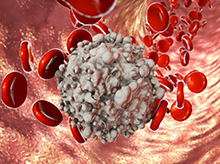
Acute myeloid leukaemia (AML) accounts for approximately 80% of acute leukaemia diagnosed in adults and the 5-year overall AML survival rate is 15%. Mutational status of FMS-like tyrosine kinase 3 (FLT3) is now well recognised as delineating a subtype of leukaemia with poor prognosis, with a higher relapse rate and a shorter duration of remission from initial therapy, as well as reduced disease-free survival and overall survival. Gilteritinib, a potent and selective oral FLT3 inhibitor, has been shown to improve the survival of patients with relapsed or refractory FLT3-mutated AML compared with standard chemotherapy. In the phase III ADMIRAL trial, gilteritinib yielded a median overall survival (OS) of 9.3 months, which was significantly longer than that of salvage chemotherapy (5.6 months). In addition, the rate of complete remission (CR) was higher in gilteritinib arm versus salvage chemotherapy (21.1% vs. 10.6%). Moreover, the safety profile of gilteritinib was considered manageable. The results thus showing that gilteritinib is potentially a promising therapy for AML.
Keywords: acute myeloid leukaemia / Gilteritinib / FLT3 inhibitor / ADMIRAL trial
Reference
Tzogani et al. Oncologist. March 2020.





